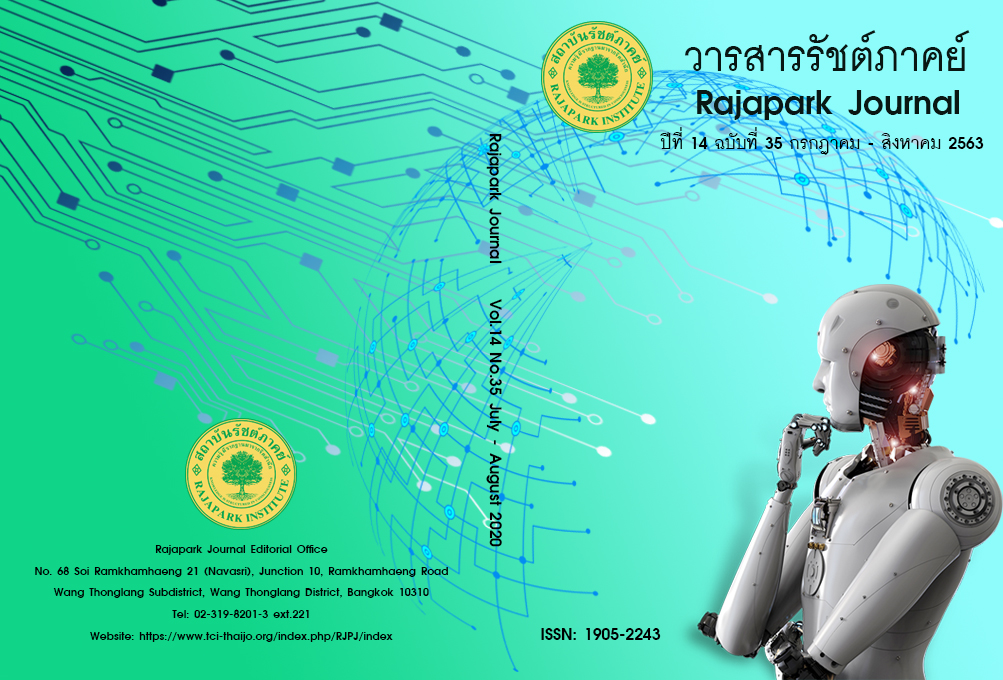Relationships, forms of trust and political participation in the democracy of Thai society
Main Article Content
Abstract
This research aimed to study 1) the level of trust and political participation in the democratic system of Thai society, 2) factors that influence trust and political participation in the democratic system of Thai society. 3) Relationship structure model trust and political participation in the democratic system of Thai society, it is survey research. The population is people in Bangkok. The sample group of 1,500 people simple model data collection using questionnaires. And statistical analysis by distributing frequency, percentage, mean, and standard deviation. An analysis of the Lisrel model. The research findings were as follows: 1) The level of political trust in the democratic system of Thai society in terms of political structure is at a high level. Political culture is at the highest level. Social trust is at a high level. And social capital is at a high-level. Participation level Politics in the democratic system of Thai society Political attitude Economic status, Thai society Political communication Political literacy and political mobilization were at the highest level. 2) Factors affecting political trust and political participation in the democratic regime of Thai society were found. The political cognitive component was the most value 1.15, followed by the economic status of Thai society with a value of 0.97 and the political attitude at 0.92 3) The structure of relations, trust and political participation of Thai society is 63% and the forecast coefficient of political-cultural variables 48.00%, social trust 28.00% and social capital 4.00%.
Article Details
Views and opinions appearing in the Journal it is the responsibility of the author of the article, and does not constitute the view and responsibility of the editorial team.
References
Agger, R. E., Goldstein, M. N., & Pearl, S. A. (1961). Political cynicism: measurement and meaning. The Journal of Politics, 23(3), 477-506.
Arnstein, S. R. (1969). A ladder of citizen participation. Journal of the American Institute of Planners, 35(4), 216-224.
Berman, E. (1997) Dealing with Cynical Citizens. Public Administration Review, 57, 105-112.
Charoensin-o-larn, C. (2012). Aesthetics and civil politics. Bangkok: Thammasat University Press.
Dalton, R. J. (1988). Citizen politic in Western democracies: Public opinion and political parties in the United States, Great Britain, Germany and France. New Jersey: Chatham House.
Easton, D. (1965). A system analysis of political life. New York: Wiley.
Gamson, W. A. (1968). Power and discontent. Homewood, IL: Dorsey.
Hansen, S. B. (1975). Participation, political structure, and concurrence. American Political Science Review, 69(4), 1181-1199.
Klingemann, H. D., & Fuchs, D. (1995). Citizens and the state. Great Britain: Oxford University Press.
Lasswell, H. D. (1958). Politics: Who get what, When, How. Meridian Book: Circa.
Miller, A. H. (1974). Political Issues and Trust in Government 1964-1970. American Political Science Review, 68(3), 951-972.
Newton, K. (2001). Trust, social capital, civil society and democracy. International Political Science Review, 22(2), 201-214.
Norris, P. (2000). Making democracies work: Social capital and civic engagement in 47 societies. Paper for European Science Foundation EURESCO Conference on Social Capital: Interdisciplinary Perspectives at the University of Exeter, September 15-20, 2000. Retrieved from: http://www.pipanorris.com
Nye, Joseph S. (1997). In government we don’t trust. Foreign Policy, 108, 99-111.
Putnam, R. (1995). Blowing alone: America’s declining social capital. Journal of Democracy, 6(1), 65-78.
Shi, Tianjian. (2001). Cultural values and political trust: A comparison of the People’s Republic of China and Taiwan. Comparative politics, 33(4), 401-419.
Welsh, M. (1973). Democracy and trust. London: Cambridge University Press.


